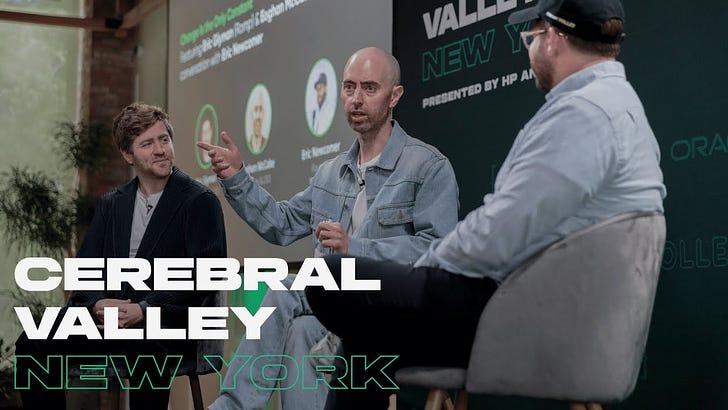Applications Over AI Models...Scott Belsky's Copyright Concerns...a New Technological Cold War. Here’s What You Missed from Cerebral Valley New York
The next installment of our talks from last week's Cerebral Valley summit
We’re back with eight more conversations from last week’s Cerebral Valley AI Summit in New York.
Subscribe to the Newcomer YouTube channel and stay tuned for more highlights.
Businesses Must Act Fast to Survive the AI Wave
Ramp’s Eric Glyman and Intercom’s Eoghan McCabe each broke down how their companies are implementing AI tools today. McCabe said he has found retrieval-augmented-generation, or RAG, to be a breakthrough for Intercom. Glyman discussed Ramp’s use of AI for features like receipt mapping, transaction coding, and expense memos.
McCabe argued that incumbent businesses facing an influx of AI-native challengers have to get on the AI bandwagon before it’s too late. “You must be willing to bet the farm and get crazy and take risks,” he said.
Are Foundational Models Already Good Enough?
Sequoia’s Pat Grady made the case for more stability and consistency at the foundation model layer, arguing it would better support founders working on AI applications. Better models won’t necessarily lead to better companies, he argued, because they’re already good enough: “I think the capabilities today are enough to build just trillions of dollars worth of new businesses.”
Investors All-In on Applications
Conviction’s Sarah Guo, Thrive Capital’s Vince Hankes, and Index Ventures’ Shardul Shah kicked off the day with a temperature check on which areas in the AI stack are likely to yield the greatest returns. Unlike past summits, where OpenAI was always the elephant in the room, the trio felt that competition and the proliferation of open-source models meant that the real value in this AI wave would be in applications. “The vast majority of founders should not be working on foundation models,” said Hankes.
Demand for Compute Remains A Sticky Issue
Crusoe CEO Chase Lochmiller steered a breakout discussion on the need for more compute power to fuel the AI boom.
Founders and investors interrogated whether we could build data centers quickly enough, since most are already close to capacity. Lochmiller stressed the need for more renewable energy resources to meet the AI demand.
Primary’s Tobias Citron questioned the premise that scale alone was the route to continued improvements in AI, and suggested that building more middleware to help AI tools run more efficiently was also a big piece of the puzzle.
Creative Professionals Need Safe AI Tools
Scott Belsky shared how Adobe is building for the AI wave, touting that the company only uses its own models, trained on licensed data, to keep its customers comfortable—and out of the courtroom. “Customers are feeling the risk—they never want us to train on their data,” he said. Brands are also very nervous about copyrighted content sneaking into their materials, he added.
Belsky said flexibility would be key for everyone in managing the AI transition. “When your platform shifts and the strategy is changing, you have to lead with adaptability,” he said.
Rising Global Tensions Spark an AI Race
The looming threat of China’s AI development is a major concern for General Catalyst advisor Teresa Carlson and Lux Capital cofounder Josh Wolfe. They spoke with ex/ante founder Zoe Weinberg.
Carlson and Wolfe agreed that China was less than six to nine months behind the U.S. in AI, and that it was crucial that the US keep investing to stay competitive. However, Wolfe disagreed with those calling AI “the new nuclear” in geopolitics: “It is far more diffuse than the local, controllable atomic matter.”
AI Meets Big Business in NYC
Datadog CEO Olivier Pomel, a product of the NYC tech scene, argued that the AI industry’s future was bright in the Big Apple, largely because the greater diversity of industries made it “easier to understand how to build the right product there than it is in the Bay Area.” He said most of his small and medium-sized business customers were still experimenting with AI tools, and that most hadn’t settled on a clear AI strategy.
Grindr CEO Says AI Will Better Personalize Romance
On the consumer front, Grindr CEO George Arison pitched a world where AI could help us make stronger personal connections with friends and loved ones, especially those who who don’t live nearby. AI dating coaches could help people gain the confidence to talk with matches, and “AI wingmen” could screen potential matches ahead of time, to better ensure that sparks will fly. “Our synthetics will talk to each other and deliver to us that conversation,” he said.





